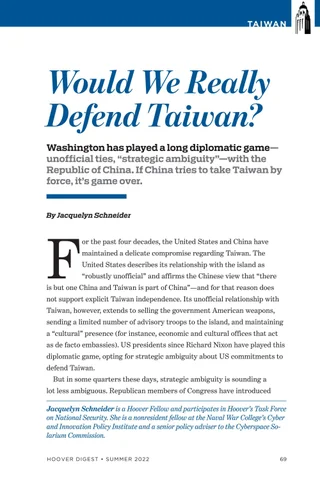TA IWA N TA I WA N
Would We Really Defend Taiwan? Washington has played a long diplomatic game— unofficial ties, “strategic ambiguity”—with the Republic of China. If China tries to take Taiwan by force, it’s game over.
By Jacquelyn Schneider
F
or the past four decades, the United States and China have maintained a delicate compromise regarding Taiwan. The United States describes its relationship with the island as “robustly unofficial” and affirms the Chinese view that “there
is but one China and Taiwan is part of China”—and for that reason does not support explicit Taiwan independence. Its unofficial relationship with Taiwan, however, extends to selling the government American weapons, sending a limited number of advisory troops to the island, and maintaining a “cultural” presence (for instance, economic and cultural offices that act as de facto embassies). US presidents since Richard Nixon have played this diplomatic game, opting for strategic ambiguity about US commitments to defend Taiwan. But in some quarters these days, strategic ambiguity is sounding a lot less ambiguous. Republican members of Congress have introduced Jacquelyn Schneider is a Hoover Fellow and participates in Hoover’s Task Force on National Security. She is a nonresident fellow at the Naval War College’s Cyber and Innovation Policy Institute and a senior policy adviser to the Cyberspace Solarium Commission. H O O V ER D IG E ST • S u m m e r 2022
69


















